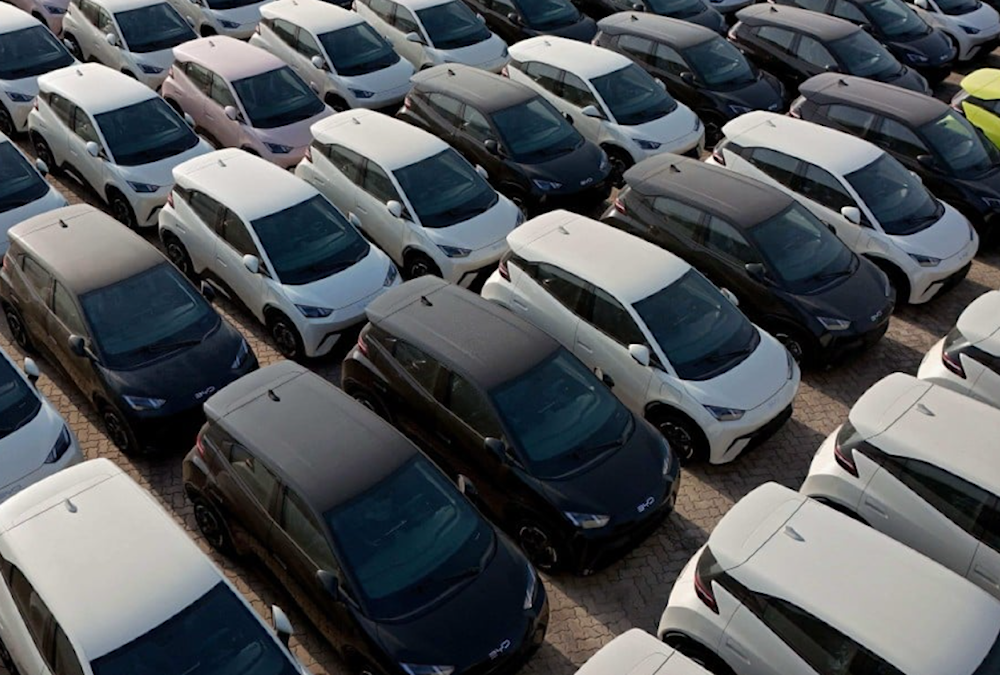US to raise tariffs on $18 bn of China imports including chips
The White House believes this will force China to end what the US believes is "unfair trade practices regarding technology transfer, intellectual property and innovation."
-

Export-bound BYD electric cars waiting to be loaded onto a ship at a port in Yantai in eastern Shandong province (AFP)
According to the White House, the US is raising tariffs on $18 billion in Chinese imports, focusing on crucial industries such as electric cars, batteries, steel, and essential minerals,
The move, which elicited a vehement response from Beijing, comes as President Joe Biden prepares for a replay of his 2020 presidential campaign against Republican candidate Donald Trump in November, with officials blasting Trump's trade record as they announced the news.
The tariff rate on EVs is expected to quadruple to 100% in 2024, while the tariff rate on chips will rise from 25 to 50% by 2025, according to the White House.
The White House believes this will force China to end what the US believes is "unfair trade practices regarding technology transfer, intellectual property, and innovation."
This comes after a review of tariffs imposed during a trade battle between Washington and Beijing when then-President Trump levied taxes on over $300 billion in Chinese imports.
The Chinese commerce ministry called the measures a politicization of economic issues and warned they would "severely affect the atmosphere for bilateral cooperation."
The so-called Section 301 probe was the major mechanism used by the Trump administration to justify tariffs, and the US Trade Representative is supposed to assess the impact of the levies after four years.
The steps conducted on Tuesday were likewise by Section 301 of the Trade Act.
In addition to EVs and semiconductors, Washington is increasing taxes on select steel and aluminum items, lithium-ion EV batteries, and battery components.
Tariffs on natural graphite and other key minerals will rise to 25% while that on solar cells would double to 50%. In April, the US State Department warned against replacing the era of dependence on Russian fossil fuels with one on Chinese critical minerals.
An anonymous US official cited that other increases such as those on non-EV lithium-ion batteries, will go into effect later while the country increases domestic battery production.
When asked about the additional measures, Beijing's foreign ministry stated that it "opposes unilateral tariff hikes in violation of WTO rules," with spokesperson Wang Wenbin stating China would "take all necessary measures to safeguard its legitimate rights and interests."
National Economic Advisor Lael Brainard stated that the levies would ensure that investments in jobs, fueled by Biden's domestic programs, are not undermined by "underpriced exports from China," accusing the country of powering its growth "at the expense of others."
"As a result of unfair practices, China's anticipated manufacturing capacity in solar is more than double the forecasts of near-term global demand," she stated.
'Negative factors' growing in US-China relations despite stability
The United States is obstructing China's development, Chinese Foreign Minister Wang Yi declared last month, during a meeting with US Secretary of State Antony Blinken.
Blinken headed to China on a diplomatic visit to discuss several key topics such as enhancing bilateral relations, as well as regional and global matters that the US perceives as concerning, and further discuss issues pertaining to responsibly managing competition to avert a possible miscalculation or conflict.
During the opening session between both officials, Wang Yi affirmed that the current diplomatic relationship between China and the US was stable, but still encompassed growing "negative factors".
"China's legitimate development rights have been unreasonably suppressed and our core interests are facing challenges," he explained.
In response, Blinken stated that the way forward with Presidents Biden and Xi Jinping's agenda was through "active diplomacy", which allows the US to recognize its differences with China to reportedly avoid miscalculations.
Ahead of the talks, US Treasury Secretary Janet Yellen expressed the US' aversion to taking options off the table in terms of responding to China's growing industrial capacity.
Yellen conveyed to Reuters Next during an interview in Washington that China achieving full employment through exporting is not deemed acceptable by the global community.

 4 Min Read
4 Min Read








